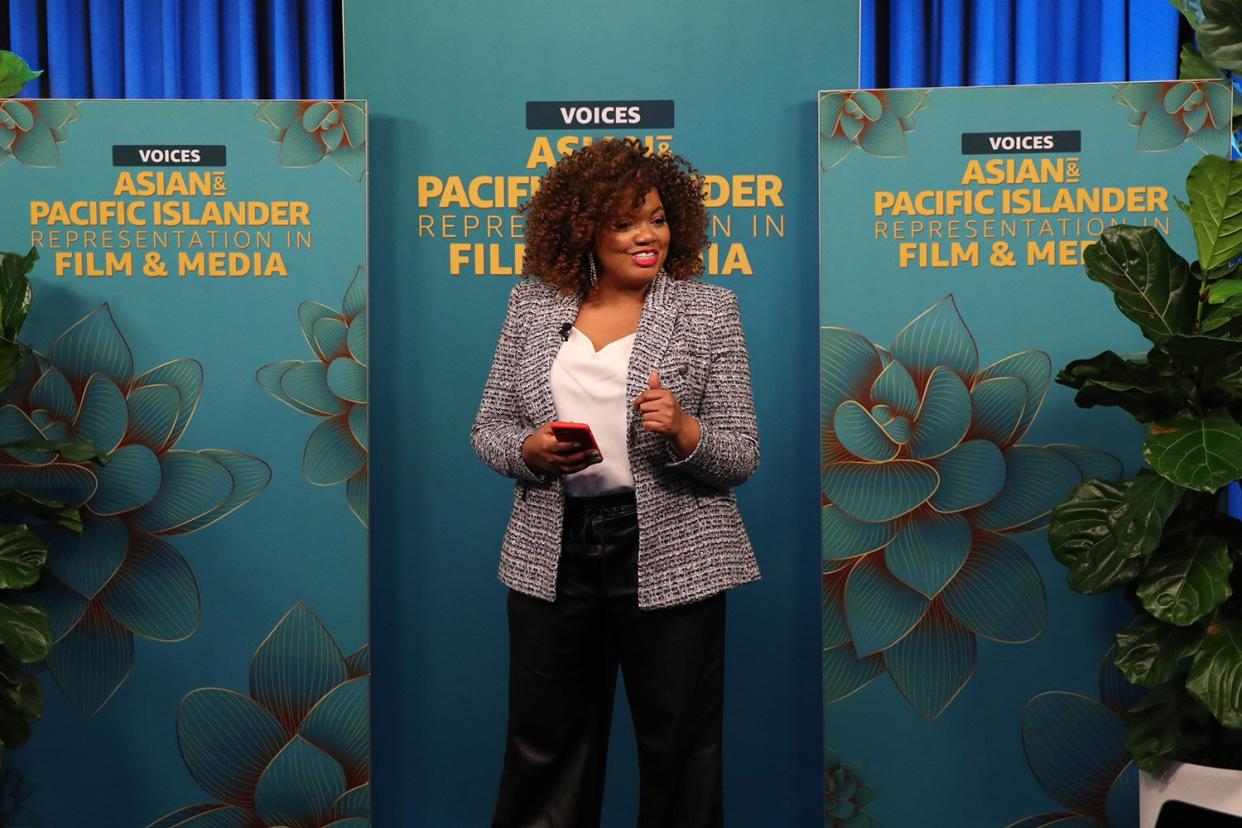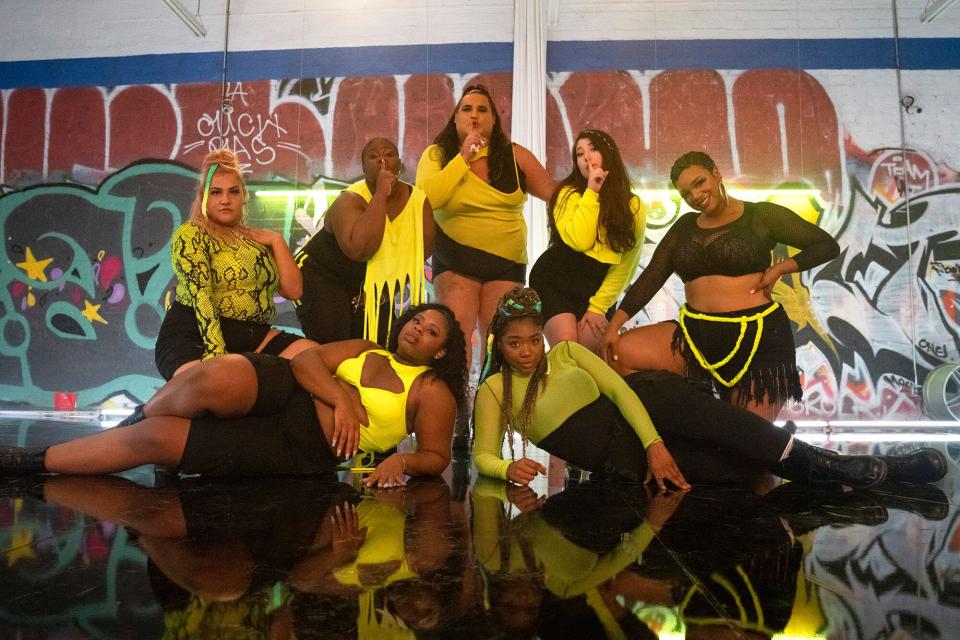How Amazon's Latasha Gillespie has made tangible change in diversity and inclusion

- Oops!Something went wrong.Please try again later.
EW Game Changers is a new series profiling the people and projects making an impact in diversity, equity, and inclusion in entertainment.
Latasha Gillespie can remember the exact moment she saw herself represented onscreen for the first time. "It was the first day Oprah Winfrey came on television in Chicago on this show called AM Chicago," she says. "I saw this brown skinned woman with a short afro, who's bigger than any other news anchor that was on television and I remember just being stunned," she recalls of that fateful day in 1984. "It changed my life."
And now Gillespie, the Executive Head of Global Diversity, Equity and Inclusion at Amazon Studios, Prime Video, and IMDb, is in a pivotal position to change others' lives as well. Since landing the role in 2018, she and her team have implemented inclusive and equitable practices at Amazon Studios.
In June 2021, Gillespie's team created an Inclusion Policy & Playbook, detailing how Amazon Studios would disrupt the biases that occur across the lifecycle of a series or movie, from the first inkling of a concept to viewers streaming the content on Prime Video. Working with creators like Riz Ahmed, Jenny Han, Lizzo, Rachel Brosnahan, Gloria Calderón Kellett, and more, Gillespie and her team developed clear directives to reach their goals including, a minimum of 20 percent women and non-binary people from underrepresented races and ethnicities in casting, and similar goals for off-camera roles above and below the line.

Jonathan Leibson/Amazon/Shutterstock Latasha Gillespie at the AAPI VOICES event
Additionally, Amazon has pledged that by 2024, 50 percent of all above the line staff, including directors, writers and producers, will be from underrepresented communities. Gillespie made sure the directives were a collaborative effort between her team and the talent.
"We asked [creators] to tell us before we rolled it out, where does it feel intrusive? Where does it feel restricting? Where does it feel bureaucratic? Where should we be going harder? And they were really insightful," says Gillespie, 48, who spent 20 years as a finance and human resources executive before pivoting to entertainment. "We made adjustments and changes to the policy and playbook before we rolled it out based on their input. We want to be a speed bump — we want to slow people down just enough to think through some of these questions, or slow them down to just make sure, am I being as inclusive as possible? Am I being as equitable as possible? But not be bureaucratic so much so that it's a roadblock."
One of the places the playbook's influence can be seen is in Prime Video's Lizzo's Watch Out for the Big Grrrls, which debuted in March. The series showcases body diverse, bigger-sized women from underrepresented communities not only living out their dreams as dancers for Lizzo, but being real about their experiences and encouraging each other along the way. Sharing traumas onscreen can often re-traumatize a person, and Gillespie made sure the women on the show felt supported at all times.
"One of the things we were very careful about is before that show rolled out, we made sure that [the cast] had access to resources, particularly thick, women of color therapists, to help deal with any possible online harassment they may receive," she states. "You can monitor some of that, but you don't know what they're getting in their DMs and all that kind of stuff. And so we wanted them to be safe, feel safe, like somebody had their back."

James Clark/Amazon Studios Cast of Lizzo's Watch Out for the Big Grrrls
Gillespie is not at all surprised she ended up working as an advocate for underrepresented communities in Hollywood. "I've always been advocating for other people," she tells EW. "I was fortunate enough that I had a father who was an extreme feminist, at least when it came to me. He was always encouraging me to use my voice, to advocate for myself. And I had to, because I grew up in a situation where I was usually the only little black girl in my class, or the only little black girl on my street. So I had a lot of situations where I was 'the only'."
That empathy has proven invaluable in her current work. "You know that Gina Carey quote 'A strong woman looks a challenge dead in the eye and gives it a wink?'" asks With Love showrunner Calderón Kellett. "Latasha gives it a wink and that one in a million smile. But make no mistake, behind that smile is perseverance, heart and a total badass willing to speak truth to power on the regular. In this journey, it is women like her that make me feel stronger — that allow me to take up space fully and that keep me going when I am tired. May we all have someone like Latasha in our corner because by her side only good trouble is on the horizon."
Still, Gillespie credits her team for doing a lot of the heavy lifting in creating the playbook and policies through their own lived experiences. She also acknowledges that the definition of diversity and inclusion is an evolving practice and might not look the same in different parts of the world.
"The definition continues to expand. We're having conversations now around the trans and non-binary community that we weren't having five years ago. And then you think about what COVID has done, and the long haulers, and how that's going to change what accessibility and people with disabilities looks like. It's constantly evolving. And then because I do this work globally, I also understand that there's a marginalized community in every country in the world. It just may look different in India than it does in Brazil."
Or in Hollywood. "I feel like my mission is just to scratch out a small corner of the world and make it better for a few other people. And if I can do that, then that feels great."
Sign up for Entertainment Weekly's free daily newsletter to get breaking TV news, exclusive first looks, recaps, reviews, interviews with your favorite stars, and more.
Related content:

